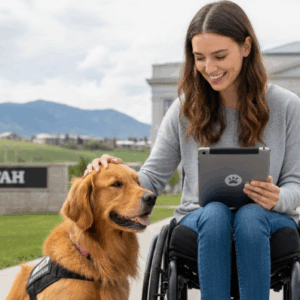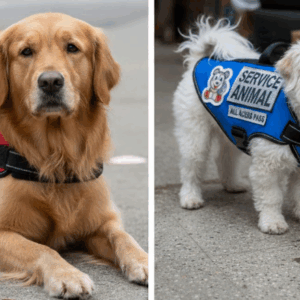Many people with mental health issues or disabilities need a service dog for daily help. In the United States, you may need a service dog letter from your doctor to show your need at school, work, or housing. A doctor’s letter or doctor’s note can be important documentation for service dog users.
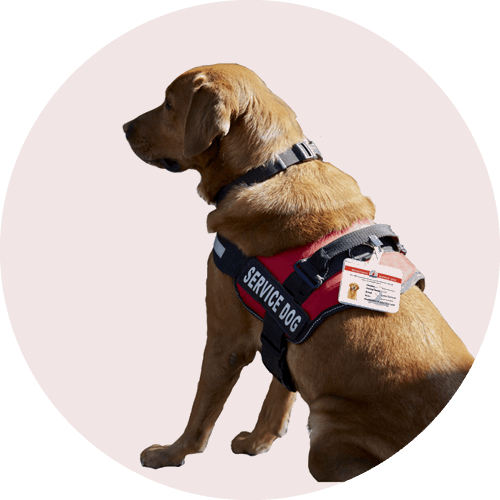

Service animals undergo specialized training to assist individuals with disabilities and improve their independence.
Having a doctor’s letter provides benefits such as legal support, easier access to accommodations, and added protection of your rights.
There are different rules for service dogs, emotional support animals, and other assistance animals. This guide will clarify those distinctions.
This guide explains step-by-step how to ask your healthcare professional for this important letter and what must be included in it. Find out what makes a good service dog letter and how it helps protect your rights under the Americans with Disabilities Act (ADA).
Key Takeaways
- A service dog letter must come from a licensed professional, such as a doctor or any licensed healthcare provider—not just mental health professionals. It should be typed on official letterhead and include the provider’s name, signature, state, and license number for 2024 federal rules.
- The letter must confirm you have a disability under ADA or ACAA law but should not state your exact diagnosis. Instead, it explains how the service dog helps with daily needs like managing PTSD, anxiety attacks, medicine reminders, or mobility issues.
- To get the letter: set an appointment with your doctor or another licensed professional, discuss your condition and how a trained service dog helps you (not just emotional support), and share medical documents that show ongoing care.
- While a doctor’s note is not always a legal requirement, having one can be immensely beneficial in many situations, such as workplace accommodations or housing requests.
- You need this letter for workplace accommodations under ADA laws or housing requests following HUD’s January 28th, 2020 guidance. Keep emails/texts to prove agreements with landlords if needed.
- Only valid letters protect your legal rights at home or work. Make sure every document has up-to-date details; missing info makes it invalid per Fair Housing Act standards in 2024.
What Is a Service Dog Letter?
A service dog letter, also known as a doctor’s letter or a signed letter stating the need for a service dog, is a formal note that must come from a licensed professional. Licensed professionals who can write a service dog letter include psychiatrists, therapists, social workers, general practitioners, neurologists, nurses, and nurse practitioners. This letter verifies that you have a disability that meets ADA rules and need the help of a trained service animal.
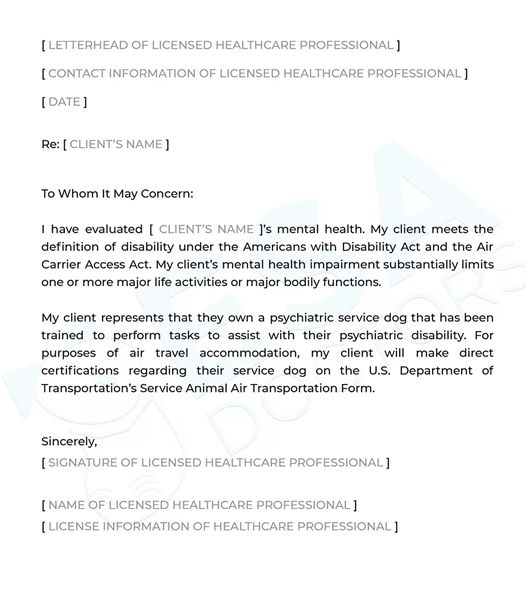

Download service dog letter for a doctor pdf template 2026.
A valid service dog letter must be issued by a licensed professional and include specific credentials.
The document covers many conditions, such as anxiety disorders, PTSD, autism, depression, or phobias. A psychiatric service dog (PSD) letter also lists tasks the dog performs; for example, helping with panic attacks or reminding someone to take medicine. The letter should reference the person’s disability and the handler’s disability to establish the connection between the medical condition and the need for the service dog.
The letter includes the doctor’s credentials—license number, state, date issued—and must be on the provider’s official letterhead with contact information and licensing details. Some people need it for housing accommodations under federal housing laws, while others use it for workplace needs due to absenteeism linked to impairments or mental health conditions.
Service dogs must perform tasks related directly to their handler’s diagnosis and treatment plan—like using a harness or leash during emergencies if needed by someone with epilepsy.
A valid PSD letter gives people legal protection at work and home under ADA regulations, states MyServiceAnimal.org expert Nick Torres.
Eligibility for a Service Dog
To qualify for a service dog, an individual must have a physical or mental impairment that substantially limits one or more major life activities. This includes a wide range of disabilities, such as mobility challenges, sensory impairments, psychiatric conditions like PTSD or bipolar disorder, and intellectual disabilities. The key factor is that the disability must significantly impact daily living, and a service dog must be able to assist by performing specific tasks that help mitigate these effects.


Documentation helps verify the legitimacy of the service animal’s role in the handler’s treatment plan.
The process begins with a consultation with a licensed healthcare provider or mental health professional. During this assessment, the provider will evaluate your health, discuss your specific needs, and determine if a service dog is an appropriate and reasonable accommodation. If so, they can issue a service dog letter, sometimes referred to as a PSD letter for psychiatric service dogs, or a doctor’s note. This documentation is essential for establishing your eligibility and is required when requesting reasonable accommodations in housing, at work, or for air travel.
Service dogs are protected under several federal laws, including the Americans with Disabilities Act (ADA), the Fair Housing Act, and the Air Carrier Access Act. These laws ensure that individuals with disabilities who have a service animal are granted public access rights, reasonable housing accommodations, and the ability to travel with their dog in the cabin of an aircraft. The Department of Housing and Urban Development (HUD) also provides guidance to ensure that housing providers understand their obligations regarding assistance animals and the documentation required to support a request.
It’s important to understand the difference between service dogs and emotional support animals. While emotional support animals provide comfort simply by being present, service dogs are task trained to perform specific tasks directly related to their handler’s disability. These tasks might include retrieving medication, alerting to panic attacks, providing physical support, or assisting with navigation. To be recognized as a service dog, the animal must be trained to perform tasks that address the individual’s disability, not just provide emotional support.
Proper documentation from a licensed mental health professional or healthcare provider is crucial. A valid service dog letter or PSD letter should confirm your disability, explain how the service dog mitigates your condition, and include the provider’s credentials. This documentation is often required by landlords, employers, and airlines to ensure legal protections and access.
Service dogs are not considered pets—they are working animals with specialized training to assist their handlers. As such, they are entitled to accompany their handler in public places, including restaurants, stores, public transportation, and housing that otherwise restricts animals. These legal protections help ensure that individuals with disabilities can participate fully in daily life, access necessary services, and live independently.
In summary, eligibility for a service dog requires a documented physical or mental impairment that substantially limits major life activities, as well as a service dog letter from a licensed healthcare professional. With the right documentation and training, service dogs provide invaluable support, helping individuals overcome barriers and lead more independent, fulfilling lives. Recognizing the vital role of service dogs is essential for building a more inclusive and accessible society for everyone.
Steps to Get a Service Dog Letter From a Doctor
To get a service dog letter from your doctor, first, make an appointment. It’s crucial to be open and honest during the discussion with your healthcare provider to ensure they can make an informed recommendation. During this visit, talk about your condition and why you need a service dog. Other documentation, such as medical records or PSD letters, may also be required to verify your eligibility.
Obtaining a service dog letter online can provide convenience and accessibility, and online services may offer additional support and resources for individuals with disabilities.
Schedule an appointment with your doctor
Contact a licensed mental health professional in your state to set up an appointment. Many doctors and psychologists offer remote visits, so you can talk to them from home if needed. During these online consultations, you can discuss your need for a service dog with a licensed professional, who can evaluate your situation and determine if a service dog letter is appropriate.
This first step helps you get assessed for psychological conditions like mood disorders or psychiatric disabilities. Some services let you split the fee into four interest-free payments for convenience.
You may also order a Psychiatric Service Dog (PSD) letter, which costs $199. Digital access is available right away as an extra option for $13. Priority processing of your request is possible for $20.
If using these services online, free US shipping comes with orders above $75 by using code FREESHIPPING75. Setting this appointment allows a medical professional or mental health expert to review your need for service animals that help with daily tasks tied to emotional support, psychiatric impairment, or compliance needs in public spaces such as workplaces and housing units.
Discuss your condition and need for a service dog
After setting your appointment, use the time with your doctor to discuss your medical condition and how it substantially limits your daily life. You do not need to disclose the specific diagnosis, but you should explain the impact your condition has on your ability to function. Common qualifying conditions for a psychiatric service dog (PSD) include anxiety, depression, PTSD, bipolar disorder, and schizophrenia, as long as they meet the ‘substantial limitation’ criteria.
Share detailed examples of moments where fear or mental impairment affects you at home or in public places.
List specific psychiatric service dog tasks that help manage your symptoms. For example, mention if the dog interrupts panic attacks or reminds you to take medicine. State if you trained the animal yourself using a professional dog trainer and describe any needed tools like a harness or collar for assistance.
Tell your healthcare provider how this support improves access and well-being at work and home. Make it clear that these are not just emotional support animals but trained service dogs who perform tasks related to your disability according to ADA rules set in 1990 and ACAA rules from 1986. Providing emotional support alone does not qualify an animal as a service dog under ADA.
Provide relevant medical documentation
After you talk with your doctor about your condition and need for a service dog, share any medical records that show your ongoing treatment. Bring documents like visit summaries or notes from mental health professionals.
These help the doctor write an accurate service dog letter.
Proof of a real patient-doctor relationship is vital. “Service animal documentation must confirm both disability and need,” says HUD guidelines for housing providers. Do not include the exact diagnosis to avoid discrimination.
For workplace needs, doctors should explain how psychiatric service dogs or therapy dogs assist with daily tasks or burnout symptoms. The provider’s license number and signature must appear on all ESA letters and related paperwork.
Keep emails or texts that prove agreement with property managers if you request accessibility in housing; this aligns with public access rights rules under ADA law. A correct letter will meet both legal requirements and the standards set by health professionals.
Request the service dog letter
Ask your healthcare provider to write a service dog letter using their official letterhead. Bring a draft of the text with you, which can help your doctor understand what is needed.
The letter must include the provider’s signature, typed name, and license information. If your main provider does not want to sign, another medical professional who treats you can write it instead.
The note should confirm that you are being treated for a life-limiting disability but should not name your specific diagnosis. It needs to state that using a service dog helps manage your condition, including psychiatric disability or emotional support needs.
You may also request add-ons like a PSD ID card for $39 or a paper certificate for $32 along with the letter. Use clear documentation like this if others ask about rules connected to housing or public access involving your registered dog wearing its harness.
For more questions on writing these letters, use the contact form offered by many mental health providers and registries online.
Key Components of a Service Dog Letter
A service dog letter must confirm your disability. It should explain how the dog helps you in daily life. The doctor’s credentials and signature also need to be included for validation. Having proper registration and documentation for your service dog provides benefits such as legal support, easier access to accommodations, and added protection for your rights.
This information is crucial for your rights and support needs. When it comes to training your service dog, you can train the dog yourself or hire professional trainers to ensure the dog meets legal standards and performs the required tasks.
Confirmation of your disability
The service dog letter must confirm you have a physical or mental impairment that limits major life activities. Under the ADA, a disability is defined as a physical, sensory, psychiatric, intellectual, or other mental impairment that substantially limits one or more major life activities. The letter should specifically reference the person’s disability and how it relates to the need for a service animal, not just a general condition. The doctor should state they are treating you for this disability, but the letter should not include your exact diagnosis.
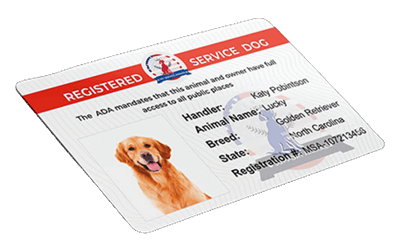

Official ID cards and medical letters work together to ensure the handler’s rights are respected in housing and employment.
For example, “The patient has a condition recognized as a disability under ADA and ACAA definitions.” This helps protect your privacy while confirming your need.
Providers such as physicians or licensed therapists must write and sign the letter with their credentials. The date is also required to show it is current. For housing, laws require only proof of the person’s disability, not any medical details.
Employers may request documentation if you seek workplace accommodations, so make sure to keep copies of all paperwork.
An appropriate provider confirms treatment for a qualifying impairment without stating specific diagnoses.
Explanation of how the service dog assists you
A service dog assists by performing trained tasks that help the person with a disability. For example, a psychiatric service dog may calm the person during panic attacks, retrieve medication, or provide grounding during a panic attack. Service dogs can also guide a person with visual impairments, pull wheelchairs, or pick up dropped items for people who have limited mobility. The letter from your doctor must explain these tasks in detail and show how they help the person manage daily life.
This explanation should focus on the dog’s roles and avoid private medical details that could lead to discrimination. Your provider should also note if this support is part of ongoing treatment.
This shows the need for a trained animal rather than an emotional support cat or untrained pet. These clear facts make it easier to meet legal standards for housing and work accommodations.
A proper dog harness can further prove the dog’s training and function as stated in your registry documents.
Doctor’s credentials and signature
The service dog letter must be a signed letter stating your need for a service dog. It should show your provider’s full name, contact details, and license information. The letter must be on official clinic or hospital letterhead, dated, and list the state of practice plus the license number for easy validation.
Only a licensed mental health professional or medical doctor treating you can sign this letter. The signature must be original or a verifiable electronic one to meet fact checked guidelines.
Any missing credential or incomplete signature will make the letter invalid. For psychiatric service dog (PSD) letters, your doctor’s state and license number are required as proof that they are allowed to provide such documentation.
These details protect both you and housing providers by confirming the letter is genuine and up-to-date according to federal rules like the Fair Housing Act in 2024.
How to Use a Service Dog Letter
A service dog letter helps you get support in different areas. You can use it for housing needs and at work to explain why your service dog is important for you. In some situations, other documentation may be required, and different rules may apply depending on the context, such as housing versus workplace settings.
For housing accommodations
Under the Fair Housing Act, housing providers may only ask two questions: Is your dog needed because of a disability? What work or task has the animal been trained to do? No special letter is required by law for service dogs in housing.
Both service dogs and emotional support animals can help people with disabilities get fair housing.
Keep records like emails or texts that show what you and your landlord agreed on about the animal. If your dog is not a usual pet, HUD rules may require more information. A sample letter should have the date, how the provider supports your request, details on how your dog helps you, plus the doctor’s signature and license number.
For full guidelines, check the HUD assistance animal document from January 28, 2020.
For workplace accommodations
A service dog can help employees with disabilities. To bring the dog to work, an employee must ask for a reasonable accommodation. This request needs proof of the disability and details about how the dog assists them.
The workplace letter should include key information. It must confirm the disability and explain how the service animal helps with job tasks. The doctor’s signature and license number are also necessary.
Employers may want evidence of the dog’s training too, such as a trainer’s letter or a demonstration period at work. Specific guidelines about behavior and interactions in the office might be required as well.
Resources like the Job Accommodation Network can provide extra help in this process.
Tips for Talking to Your Doctor About a Service Dog Letter
Schedule a time to meet with your doctor. Come prepared with clear ideas about why you need a service dog. Discuss your condition openly. Share how the dog will help improve your daily life. While a doctor’s note is not always legally required to get a service dog letter, having one can be beneficial in many situations, such as for housing or travel, as it helps substantiate your need.
Bring a draft of the letter for them to sign without changes. This can make it easier for your provider. Explain that any treating professional, like a psychiatrist or therapist, can write the letter too.
Stress that it should confirm a disability without naming it specifically and include their credentials and signature.
Use simple templates or guides to support this conversation; they help ensure all legal points are covered well. Getting this right is key for using the service dog letter in housing or work situations effectively.
Conclusion
Getting a service dog letter from your doctor can be straightforward. Start by meeting with your doctor to discuss your needs. Share any medical papers that support your request. Make sure the letter includes key details like your disability and how the dog helps you. Use this letter for housing or workplace needs when required.



